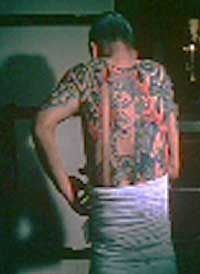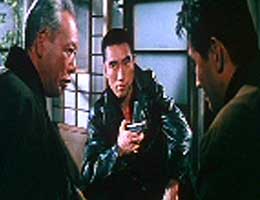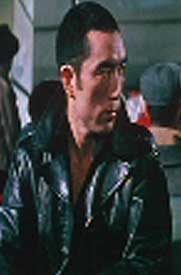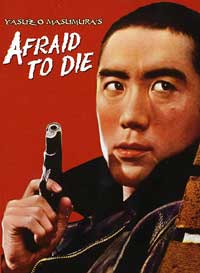 Novelist Yukio Mishima would've won the Nobel Prize if he'd lived a little longer or not been such a perv, & it's a dirty shame he is so often alluded to as the "notorious Japanese author" instead of the brilliant author of several classic novels of the highest order of greatness. But it is also true that he was about as notorious as an author can ever get. Novelist Yukio Mishima would've won the Nobel Prize if he'd lived a little longer or not been such a perv, & it's a dirty shame he is so often alluded to as the "notorious Japanese author" instead of the brilliant author of several classic novels of the highest order of greatness. But it is also true that he was about as notorious as an author can ever get.
He could obviously have become a big movie star if he'd wanted to, as he was simply a giant talent in just about every area he approached. But he only did a few films, & only did those when the projects fell into regions of his twisted idea of fun.
In Yasuko Masumura's Afraid to Die (Karakaze-yaro, 1960) Mishima stars as Takeo Asahina, a young leather-jacketed yakuza just out of prison. Mishima would only agree to play the role if he was permitted to be tricked out in leather, & that concession turned out to be a good one for the film.
Mishima is quite the cutie. His high-pitched voice is wonderfully disconcerting among yakuza players with deep manly voices. He's a small buff guy who comes off as a combination James Cagney & James Dean, with the odd beauty of a Humphry Bogart instead of standard movie star looks.
The the leading lady is the beautiful world-class actress Ayako Wakao as Asahina's girlfriend Yoshie. In an almost charmingly misogynist theme of sadomasochism (one of Mishima's actual perversions), he beats then rapes a nice girl (Wakao) then tells her, "I'm not all bad," & she's inclined to agreee, falling in love with her rapist. Only in an s/m "scene" of sexual fantasy could that ever happen!
 Also in the support cast is the superb character actor Takashi Shimura as the elderly tattooed gambler, Asahina's uncle. Also in the support cast is the superb character actor Takashi Shimura as the elderly tattooed gambler, Asahina's uncle.
Asahina is an underboss, head of a gang so small that the only thing they can claim to control is one small club. Despite their inconsequentiality, a rival yakuza gang seeks Asahina's death for his having wounded their boss Susumu Aikawa (Eiji Funakoshi) two & a half years before (the length of Asahina's prison term).
"Asthma" Masa was hired to assassinate the young boss, but killed the wrong guy. The plot involves gangsters selling toxic drugs & troubling union organizers, with the corrupt cops siding with the gangsters. But frankly the only thing that matters in this film is what happens to the character of Asahina.
The rival boss is a gimpy weak sort but even so, Asahina is afraid to attack him openly as his Uncle Gohei recommends. There is no exaggerated good vs evil here; Asahina is a rebel without much of a cause & it's essentially the cowardly rapist versus a bunch of creepy gangster dorks. When Asahina feels cornered, he resorts to kidnapping his rival's little girl. Unheroic bastard though he is, it is impossible not to like him at least a little. Though he claims to be a coward he has no problem telling a couple thugs twice his size, "Big guys have small larries."
 Even without a hero anywhere in the film, as an anti-hero Mishima definitely scores top of the heap. He's increasingly influenced by his girlfriend, pregnant from his having raped her, & slowly begins to think about leaving the gangster world & becoming a responsible husband & father. Within the simple irony of such films, you just know when he starts thinking about finally being a good guy he's fucked himself big-time & is doomed, same as a homeless character out of O. Henry who wants to be put in jail on Christmas eve for the sake of a warm meal keeps failing to get arrested until the moment he decides to stop being a bum & do something positive about his life; only then is he off to jail. Even without a hero anywhere in the film, as an anti-hero Mishima definitely scores top of the heap. He's increasingly influenced by his girlfriend, pregnant from his having raped her, & slowly begins to think about leaving the gangster world & becoming a responsible husband & father. Within the simple irony of such films, you just know when he starts thinking about finally being a good guy he's fucked himself big-time & is doomed, same as a homeless character out of O. Henry who wants to be put in jail on Christmas eve for the sake of a warm meal keeps failing to get arrested until the moment he decides to stop being a bum & do something positive about his life; only then is he off to jail.
Another of Mishima's perversions was the fetishistic sentiment toward death. In real life (& real death, in 1970) Mishima committed "classical" seppuku, with one of his young martial artist lovers as "second" to chop off his head (rather clumsily as it turned out). In Afraid to Die he eventually decides to reform, which the irony of such a film necessatates going all awry. And Mishima turns in a highly effective if hammy death scene in which he winds down like a monkey toy.
This is a beautifully designed film with fine cinematography, somewhat satiric in approach but easy to take with a straight face. It's simply a very fine film more reminiscent of Cagney & Bogart film noir classics than the usual yakuza-eiga, though with any other star than Mishima it might not have been so extraordinary.
As a yakuza genre film it was made a couple years before the conventions of that genre had too much narrowed into unutterable predictability. As a work of art it belongs to the same class of "new wave" avant garde filmmaking that gave us Oshima.
copyright © by Paghat the Ratgirl
|

